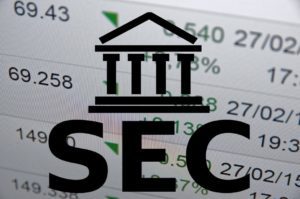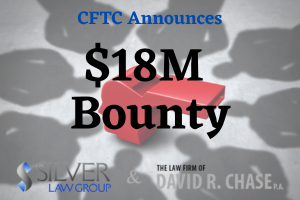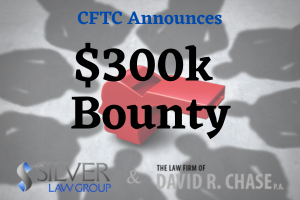 In our previous post, we reviewed the major provisions of the Anti-Money Laundering Act of 2020 (AMLA), an expansion of the Bank Secrecy Act (BSA). We also started tackling the enforcement priorities of the Department of Treasury’s Financial Crimes Enforcement Network (FinCEN), the agency most responsible for anti-money laundering enforcement. Now that we have a sense of what AMLA is about and what prosecutors are focused on, we’ll look at how it expands the pool of eligible whistleblowers and the compensation they might receive. Continue reading
In our previous post, we reviewed the major provisions of the Anti-Money Laundering Act of 2020 (AMLA), an expansion of the Bank Secrecy Act (BSA). We also started tackling the enforcement priorities of the Department of Treasury’s Financial Crimes Enforcement Network (FinCEN), the agency most responsible for anti-money laundering enforcement. Now that we have a sense of what AMLA is about and what prosecutors are focused on, we’ll look at how it expands the pool of eligible whistleblowers and the compensation they might receive. Continue reading
What Is The Anti-Money Laundering Act Of 2020? (Part 1)
 On January 1, 2021, overriding a veto by then-President Trump, the Senate passed into law the Anti-Money Laundering Act of 2020 (AMLA)—the largest anti-money laundering legislative effort since the 2001 Patriot Act. The AMLA fortified existing laws, such as the Bank Secrecy Act (BSA), as well as a somewhat anemic whistleblowing program, to align it more closely with the highly-successful Securities and Exchange Commission (SEC) whistleblower program. Continue reading
On January 1, 2021, overriding a veto by then-President Trump, the Senate passed into law the Anti-Money Laundering Act of 2020 (AMLA)—the largest anti-money laundering legislative effort since the 2001 Patriot Act. The AMLA fortified existing laws, such as the Bank Secrecy Act (BSA), as well as a somewhat anemic whistleblowing program, to align it more closely with the highly-successful Securities and Exchange Commission (SEC) whistleblower program. Continue reading
SEC Examiners Paying Closer Attention To Crypto, Cyber And ALM
 The rash of cryptocurrency failures, cybersecurity failings, and potential for money laundering are a focus of the U.S. Securities and Exchange Commission (SEC) examiners in the coming year. The high-profile FTX case and criminal charges against Sam Bankman-Fried and others have brought the issues to the SEC’s attention. The SEC handled 24 enforcement actions involving cryptocurrency in the first half of 2023. Continue reading
The rash of cryptocurrency failures, cybersecurity failings, and potential for money laundering are a focus of the U.S. Securities and Exchange Commission (SEC) examiners in the coming year. The high-profile FTX case and criminal charges against Sam Bankman-Fried and others have brought the issues to the SEC’s attention. The SEC handled 24 enforcement actions involving cryptocurrency in the first half of 2023. Continue reading
CFTC Awards $18M Bounty To Whistleblower
 The Commodities Futures Trading Commission (CFTC) recently announced the award of $18 million to a single whistleblower who provided substantial assistance to the agency. This information led to a successful CFTC enforcement action as well as a related action with another federal agency. The whistleblower met with Division of Enforcement (DOE) staff on multiple occasions to discuss their concerns. Information from the individual was “significant in amount and quality,” according to the CFTC press release. Continue reading
The Commodities Futures Trading Commission (CFTC) recently announced the award of $18 million to a single whistleblower who provided substantial assistance to the agency. This information led to a successful CFTC enforcement action as well as a related action with another federal agency. The whistleblower met with Division of Enforcement (DOE) staff on multiple occasions to discuss their concerns. Information from the individual was “significant in amount and quality,” according to the CFTC press release. Continue reading
D.E. Shaw Settles With SEC Over Whistleblower Rule Violations
 New York-based hedge fund investment and technology development firm D. E. Shaw has settled with the SEC over charges that it violated the rights of current and former employees when it raised “impediments” for them to become whistleblowers. The SEC also fined D. E. Shaw $10M to settle the charges. D. E. Shaw has since updated its documentation to allow employees to contact the SEC and other agencies to report possible misconduct. Continue reading
New York-based hedge fund investment and technology development firm D. E. Shaw has settled with the SEC over charges that it violated the rights of current and former employees when it raised “impediments” for them to become whistleblowers. The SEC also fined D. E. Shaw $10M to settle the charges. D. E. Shaw has since updated its documentation to allow employees to contact the SEC and other agencies to report possible misconduct. Continue reading
CFTC Issues Award Of $300,000 To Whistleblower
 The Commodity Futures Trading Commission (CFTC) announced an award of more than $300,000 to a whistleblower who submitted information to the agency regarding a company’s misconduct.
The Commodity Futures Trading Commission (CFTC) announced an award of more than $300,000 to a whistleblower who submitted information to the agency regarding a company’s misconduct.
Information from the whistleblower was “precise,” and described exactly the activity involved, leading to the CFTC’s Enforcement Division to open an investigation. The individual provided continual assistance during the investigation, offered additional evidence along with interpretations and explanations for CFTC staff. As a result, CFTC staff were able to move forward with the investigation while conserving resources. Continue reading
CFTC Awards $15M To Two Whistleblowers
In a recent press release, the Commodities Futures Trading Commission (CFTC) announced $15 million in bounties awarded to two whistleblowers for individual cases.
the Commodities Futures Trading Commission (CFTC) announced $15 million in bounties awarded to two whistleblowers for individual cases.
In the first case, a whistleblower affiliated with a company notified the CFTC of activity that was harming its customers. The CFTC opened an investigation and discovered the information to be credible and original. The individual offered continual assistance, saving CFTC staff resources and time. This included assisting staff with interpreting vital evidence, including another witness to corroborate the claims. Continue reading
SEC Charges CRBE For Limiting Ex-Employees’ Whistleblower Rights
 The SEC settled charges against CRBE, a Dallas-based commercial real estate services and investment firm, for using a clause in their separation agreements that violated the Securities and Exchange Commission’s whistleblower protection rule. Departing employees could receive separation pay only if they signed a release that stated they had not filed any complaints against the firm with the SEC or any other federal agency. This violates the SEC’s whistleblower protection rule for those employees. During 2021 and 2022 nearly 900 former employees had signed this release as part of their separation agreement. Continue reading
The SEC settled charges against CRBE, a Dallas-based commercial real estate services and investment firm, for using a clause in their separation agreements that violated the Securities and Exchange Commission’s whistleblower protection rule. Departing employees could receive separation pay only if they signed a release that stated they had not filed any complaints against the firm with the SEC or any other federal agency. This violates the SEC’s whistleblower protection rule for those employees. During 2021 and 2022 nearly 900 former employees had signed this release as part of their separation agreement. Continue reading
SEC Sanctions Monolith Resources For Violation Of Dodd-Frank Act
 Can a company prohibit former employees from speaking to federal regulators, such as the SEC, and function as a whistleblower? They can certainly try, but it is still illegal.
Can a company prohibit former employees from speaking to federal regulators, such as the SEC, and function as a whistleblower? They can certainly try, but it is still illegal.
Monolith Resources, LLC, based in Nebraska, included language in their employment separation agreements prohibiting departing employees from recovering money through participation in investigations, enforcement actions, or filing claims with the government. This includes participating in the SEC’s Whistleblower program. Continue reading
SEC Awards $18M Bounty To Latest SEC Whistleblower
 The SEC recently announced yet another sizeable award to an individual who came forward as a whistleblower. In the press release, the SEC described the $18 million award to a single individual who “refused to turn a blind eye to the wrongdoing, reporting misconduct internally and then to the Commission.” Continue reading
The SEC recently announced yet another sizeable award to an individual who came forward as a whistleblower. In the press release, the SEC described the $18 million award to a single individual who “refused to turn a blind eye to the wrongdoing, reporting misconduct internally and then to the Commission.” Continue reading
 SEC Whistleblower Lawyer Blog
SEC Whistleblower Lawyer Blog

